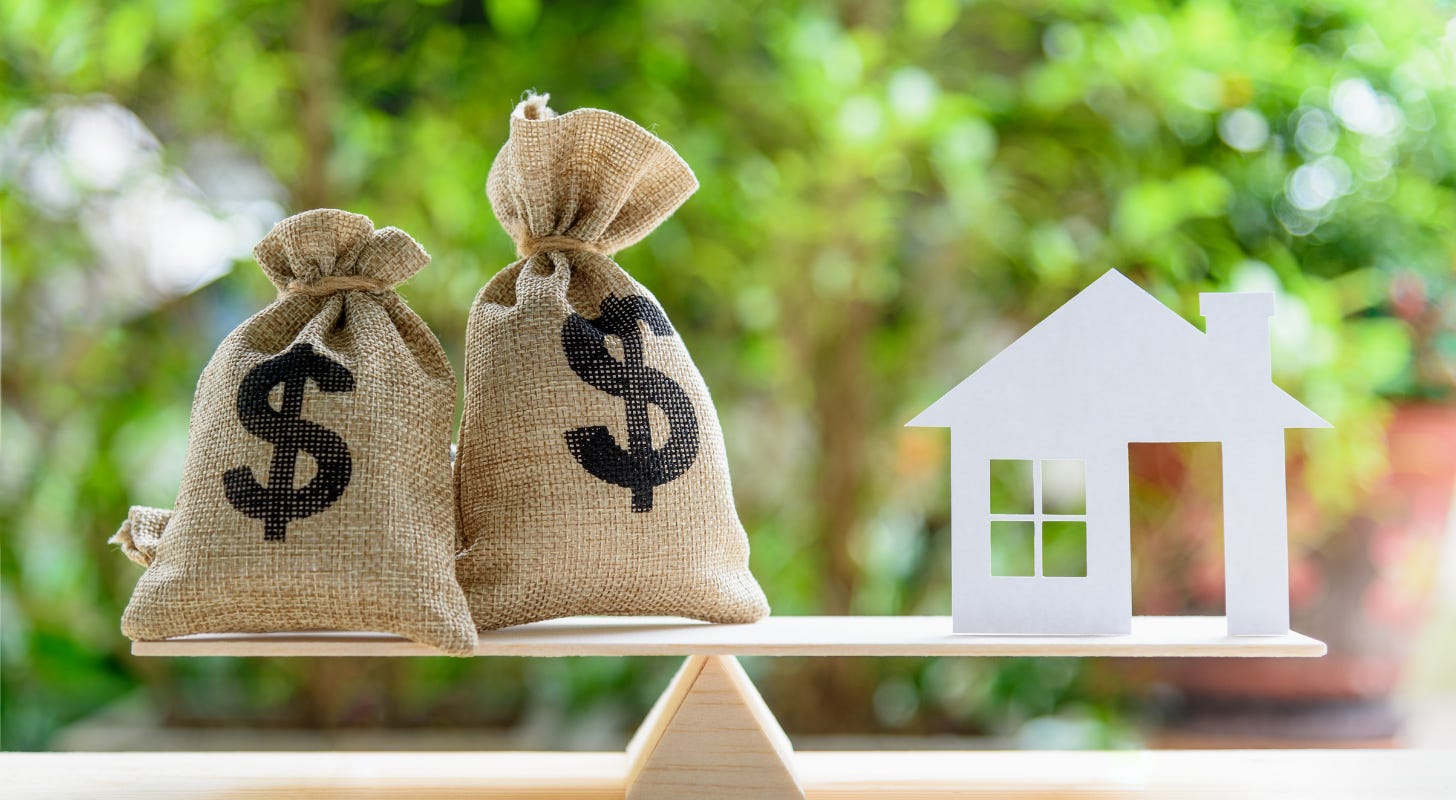My answer is own!
Own?
In this market?
Are you nuts? House prices have skyrocketed! Real (adjusted for inflation) home values are up 60 percent over the past decade. You have to back up 16 years – to 2006 – to see real house prices anywhere close to where they are now. Plus, rents haven’t kept up. The price-to-rent ratio is historically high.
Economists are supposed to know the price of everything and the value of nothing. But maybe that’s giving you people too much credit. Do you realize where house prices are?
Hold on.
Understanding the true cost of owning is tricky. The costs of maintenance, insurance, and property tax bills are obvious. But there is a key additional cost that most people don’t get straight. And yes, it involves the price of the house. But it’s the house price (your investment) multiplied by the return you could earn were you to invest the money. That’s the investment income you lose – the opportunity cost – of living in the house, rather than selling it and investing the proceeds.
Today, the house price is very high, but the return you could otherwise earn is very low, indeed negative, leaving the product of the two numbers – the opportunity cost of owning – crazy low.
An example will help.
Suppose you buy a house/condo for $300K in cash with $12K in annual expenses. How does this compare with renting the same house for, same, $1K a month and investing your $300K in inflation-protected, one-year Treasury bills? (These are called TIPS – Treasury Inflation Protected Securities).
The real return on one-year TIPS is historically low. It’s actually hugely negative -- minus 4 percent! If you multiply $300K by minus 4 percent, you get negative $12K. Hence, the total annual cost of owning right now is the positive $12K in maintenance cost, insurance, and property taxes plus the negative $12K opportunity cost. That adds up to zero.
Owning, in this example, costs nothing.
What about renting? Suppose you can rent the house/condo for $1K per month or $12K percent. If you do so and invest the $300K in one-year TIPS, you’ll not only shell out $12K in rent, but lose $12K on the TIPS investment. (Again, the for-sure return is negative 4 percent).
Hence, owning in this example costs nothing. Renting cost $24,000!
OMG! You economists are such idiots. I’d rent and invest the $300K in stocks. They’ve been yielding above 8 percent annually, after inflation, for the last thirty years. Why would I invest $300K in TIPS and lose, after inflation, $12K for sure when I can make a positive $24K investing my $300K in stocks?
The answer is risk. The stock market is extremely volatile. On average it does well. But these days, it’s so risky that people are willing to pay a massive amount to keep their money safe from inflation as well as from a massive decline in the value of stocks. Stocks have already dropped 5 percent this year.
OMG squared! “Idiots” is far too kind. Yes, the stock market is risky. But so are housing prices. If I buy, my $300K house could lose value. Real house prices fell by one-third after the Great Recession.
You’re right. But chill. Inflation is running 8 percent annually. Houses are a terrific inflation hedge because, like paintings, they are real assets whose prices, other things equal, should keep steady with inflation. In fact, house prices are, of late, outpacing inflation by a factor of two! So yes, house prices could crash like they did after the Great Recession. But we’re not in a recession. The economy is booming. It grew at 7 percent last year – the strongest performance since 1984.
Yes, many people are now predicting an economic slowdown. But not me. We’re moving into war footing, preparing to take on Russia. Congress just passed a $1.5 primarily military spending bill. That spending represents major economic stimulus that will offset the reduction in COVID relief.
Here’s another reason I like owning over renting despite the high price of homes. Most people need to borrow to purchase. But 30-year mortgage interest rates are still historically low. Back in 1981 when inflation was also raging, the 30-year rate was close to 18 percent! Today, it’s 4.5 percent. Inflation, as mentioned, is running at 8 percent. Assuming inflation remains this high, the annual real interest rate on a 30-year mortgage is now negative 3.5 percent. How will you benefit from this negative rate? By making your monthly mortgage payments in increasingly watered-down dollars.
Ok, I see you are thinking more carefully than I thought. So, let’s just stick with “Economists know the price of everything and the value of nothing.”
Sorry, wrong again. As I make clear in my new book, Money Magic, economists can value everything, even love.
Laurence Kotlikoff is a Boston University Economist, a NY Times Best Selling Author, President of maxifi.com, and Author of Money Magic.





It seems that where some people might become confused is that they compare the cost of paying CASH for a house (i.e., your $300k example) vs. renting. As you point out in this article, mortgage rates have been historically low, and even now (April 2022) are still on the low side. If someone can have the benefits of a house by only placing 20% down -- say, $60k on your hypothetical house -- then they can still invest the other $240k in vehicles that are likely to grow over time.